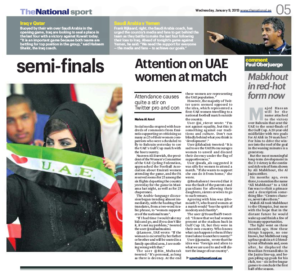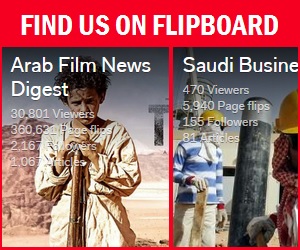Causing a stir: Twitter and the news media
 The latest in a long line of Twitterpower case studies came last week with the news piece in The National highlighting Twitter outrage at the decision to send 25 Emirati women to Bahrain to watch the UAE play Bahrain in the Gulf Cup. The prevailing tide of expressed opinion was strongly against the activity, rallying around the Arabic hashtag
The latest in a long line of Twitterpower case studies came last week with the news piece in The National highlighting Twitter outrage at the decision to send 25 Emirati women to Bahrain to watch the UAE play Bahrain in the Gulf Cup. The prevailing tide of expressed opinion was strongly against the activity, rallying around the Arabic hashtag #مشجعات_المنتخب (‘Mushajiyat Al Muntahab’: essentially meaning “The female supporters of the national league”).
It’s not the first Twitter outrage story we’ve seen and most certainly won’t be the last. And although there was undoubtedly a strong opinion expressed on Twitter, including criticism from some prominent figures, it does beg the question how much does Twitter influence mainstream opinion and what’s the media’s role in reporting such Twitter outrages?

Translation: My dear #FemaleSupportersofNationalLeague you misunderstand the meaning of patriotism, our traditions and norms are completely different to those where you come from.
Flying in the face of many previous tweet-storm stories, The National’s football supporters’ story was informative and well balanced. A contrast to, for example, the coverage of Twitter outrage at Madonna’s concert last year, which reported on angry fans embittered by Madge’s taking to the stage tardily. That story was stood up on three or four tweets – one of which was taken totally out of context (and clearly had been sent hours before the concert was due to start). About 300 Twitter users wrote tweets regarding the female football supporters trip to Bahrain using the Arabic hashtag resulting in more than 1,000 mentions Twitter (65% of the total 1,000+ mentions were retweets).

Translation: I hope every woman participating in the game knows that she only represents herself. The UAE is far more precious and important for it to be represented in this cheap way
As I pointed out when we talked about this on Dubai TV show ‘Emirates Business 24×7’ last week (see video below), Twitter rather challenges news journalism to actually deliver on the ‘context and analysis’ journalists claim makes them better than the unfiltered stream of eyewitness accounts and expressed opinion we are now accessing. It’s hard to do when you’re battling for relevance – if you try and work at Twitter speed you’re going to be little more reliable than the unfiltered stuff. If you wait to research the story properly, you’re going to be posting your coverage up on the CMS just as everyone else has moved on to the next story.
Another challenge is reporting on social platforms based on limited understanding. The Internet is essentially self-correcting – expressed opinions online tend to be more polarised but also tend to attract opinion of the opposite polarity, leading to debate that tends to either moderate the original expressed sentiment or merely exhaust all the protagonists.
Analysing sentiment, quantifying reaction and evaluating the true likely impact of these is actually something we do for clients. If all journalists did this before filing the reports of outrage, they’d be serving us better. And providing, in fact, context and analysis.
Alexander McNabb was interviewed by Dubai One TV’s Emirates 247 news programme about Twitter activism and the news media last week. Watch the interview below.
Watch the video
Dubai One TV Emirates 24/7 – 6.30pm January 9, 2013 (7.06 mins)
Read more about Twitter
How ‘social’ was GITEX 2012? (21 October 2012)
GITEX 2012 Social Buzz (8 October 2012)
#StopTimeOutDubai rings alarm bells (25 July 2012)
Five Smarter Tweeting Tips (22 January 2012)
Should you outsource your conversation? (19 January 2011)
Twitter & Customer Service Survey (29 March 2010)
Follow us on Twitter
Tags: activism, Alexander McNabb, Dubai One, Emirates, Emirates 24/7, football, Gulf Cup 21, hashtag, journalism, media, news, reporting, sentiment, social media, The National, Twitter, UAE


